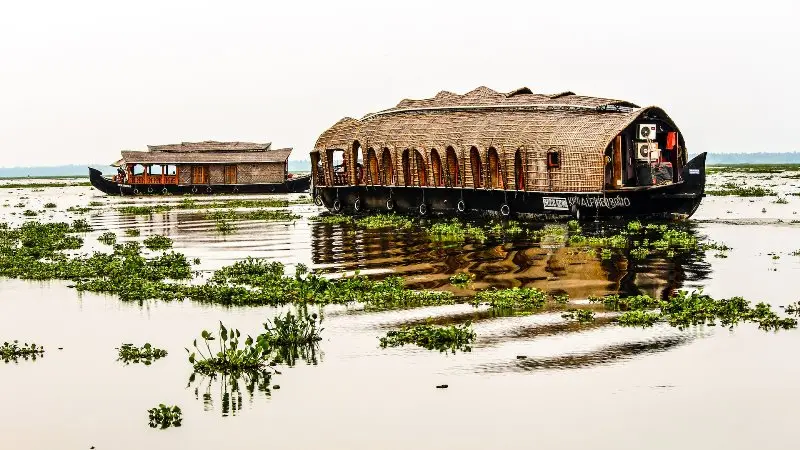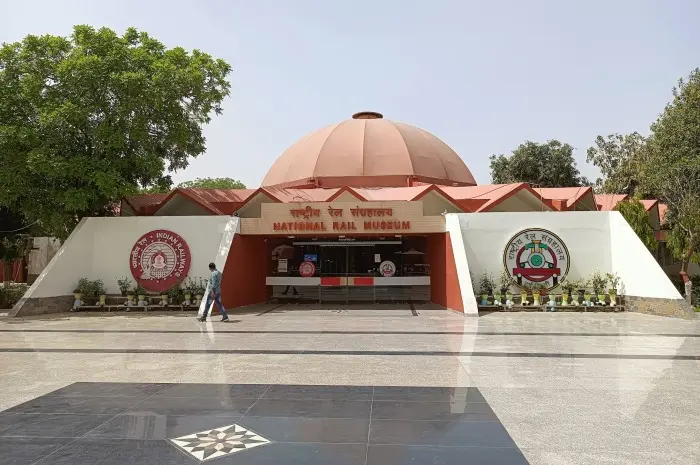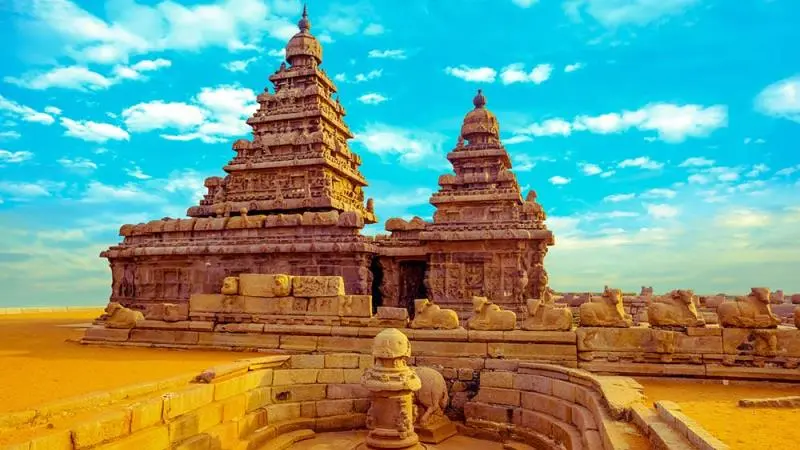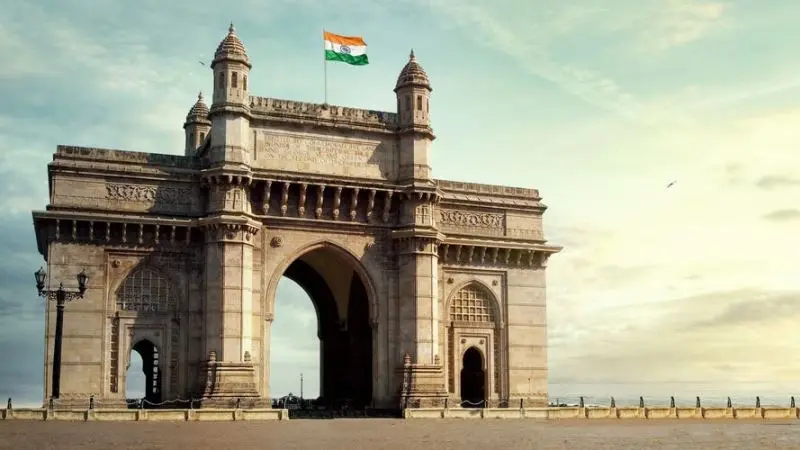| Entry Fee: Start 25 INR; Location: Check Map Address: Punnamada, Vembanad Lake, Aryad South, Kerala, India. |
The Kerala Backwaters, a network of brackish lagoons and lakes lying parallel to the Arabian Sea coast in southern India, form one of the most unique aquatic landscapes in the world. This intricate maze, comprising over 900 kilometers of waterways, is located in Kerala, fondly referred to as ‘God’s Own Country’ for its lush greenery and abundant natural beauty.
The Backwaters significantly contribute to Kerala’s reputation as a paradise for nature and peace lovers. These tranquil waterways, interspersed with small islands, villages, and lush tropical vegetation, offer a serene escape from the hustle and bustle of city life. Their unique ecosystem, traditional lifestyles, and idyllic beauty make the Backwaters a quintessential part of Kerala’s charm and allure.
1. Understanding the Kerala Backwaters
1. Explanation of what constitutes the Backwaters
The Kerala Backwaters are composed of five large lakes, including Vembanad Lake, which is the largest, linked by manmade canals and fed by 38 rivers. These interconnected waterways create a labyrinthine network that extends almost half the length of Kerala. This unique topographical feature forms an estuarine ecosystem, where freshwater from rivers meets with seawater.
2. Unique Ecosystem and Biodiversity Found in the Backwaters
The Kerala Backwaters host a unique and rich ecosystem. The brackish waters are home to diverse aquatic life, including various species of fish, crabs, frogs, and water birds like terns, kingfishers, and darters. The shores and islands are lush with tropical vegetation and are inhabited by a variety of birds and animals. This diversity of life forms lends an added charm to the scenic beauty of the Backwaters.
2. Historical and Cultural Significance
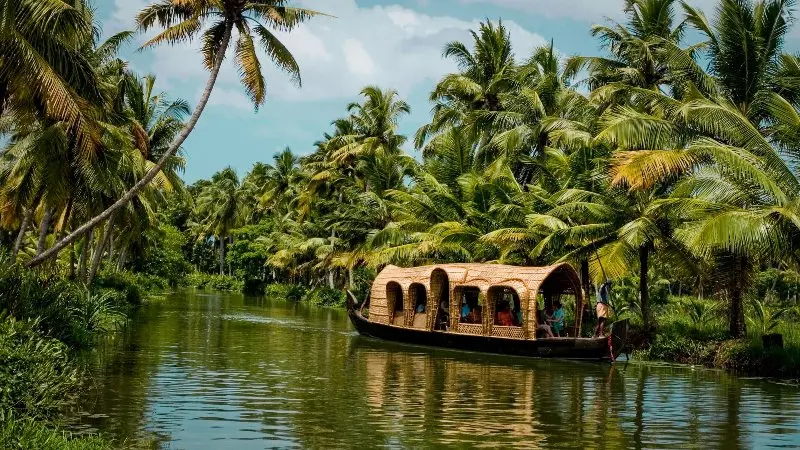
1. Use of the Backwaters for Transportation, Trade, and Fishing
Historically, the Kerala Backwaters have been an essential lifeline for the people of the region. They have been used for transportation, fishing, and agriculture for centuries. Even today, these waterways are a significant mode of local transportation. The Backwaters also played a crucial role in trade, especially during the times when Kerala had extensive maritime commerce with countries like Rome, China, and the Arab nations.
2. Cultural Traditions and Practices Tied to the Backwaters
The Kerala Backwaters are deeply intertwined with the cultural fabric of the region. They influence the local lifestyle, culinary practices, and traditional occupations, such as coir-making, boat-building, and fishing. The annual Nehru Trophy Boat Race on the Punnamada Lake is a popular cultural event that attracts visitors from around the world.
3. Role of the Backwaters in Local Folklore and Literature
The enchanting beauty of the Backwaters and the traditional lifestyles of the people living along its banks have found mention in local folklore and literature. Several Malayalam poems and novels romanticize the backwater regions, reflecting their integral role in shaping the region’s cultural and literary identity.
3. Tourist Attractions and Experiences in the Backwaters
1. Houseboat Tours and Their Appeal
One of the most distinctive experiences in the Kerala Backwaters is a houseboat tour. Originally used to transport rice and spices, these traditional ‘kettuvallams’ have been converted into luxurious houseboats equipped with modern amenities. A stay in these houseboats offers an immersive experience of the Backwaters’ scenic beauty, rural lifestyle, and unique ecosystem.
2. Prominent Regions to Visit
Alleppey, also known as Alappuzha, is often referred to as the ‘Venice of the East’ due to its vast network of canals and is a popular starting point for houseboat tours. Kumarakom, located on the banks of Vembanad Lake, is renowned for its bird sanctuary and luxury resorts. Kollam, another important region, offers visitors a mix of the serene backwaters, historic remnants, and beautiful landscapes.
3. Wildlife Viewing Opportunities
The Backwaters are home to diverse fauna, including otters, turtles, and a variety of birds, making it a paradise for wildlife enthusiasts. The Kumarakom Bird Sanctuary, located on the eastern banks of the Vembanad Lake, is a favorite spot for bird watchers.
4. Local Cuisine Experiences
The Kerala Backwaters offer tourists the chance to sample traditional Kerala cuisine, known for its liberal use of spices, coconut, and seafood. Many houseboat tours include meals prepared by local chefs, allowing visitors to enjoy authentic Kerala dishes amidst the serene beauty of the Backwaters.
4. Economic Impact of the Backwaters
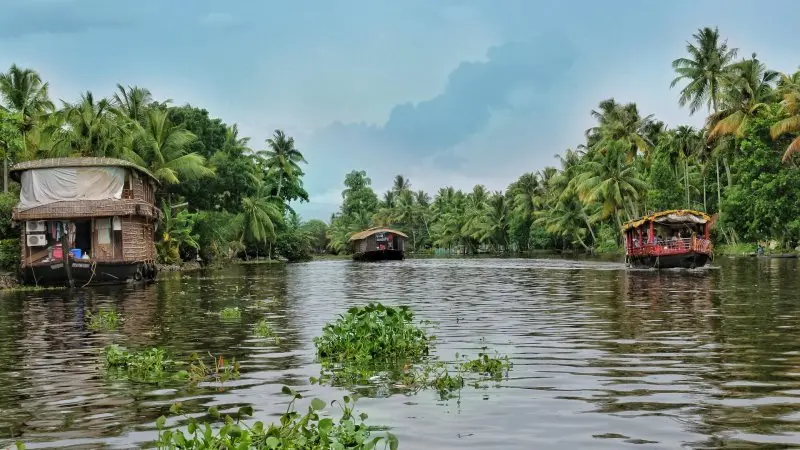
1. Importance of the Backwaters for Kerala’s Tourism Industry
The Kerala Backwaters are a major draw for tourists, both domestic and international, making them a significant contributor to the state’s tourism industry. The unique experiences offered by the Backwaters, including houseboat stays, bird watching, and local cuisine sampling, appeal to a broad spectrum of tourists. This tourism activity generates income for local businesses and employment for the local population.
2. Role of the Backwaters in Local Agriculture and Fishing Industries
The Backwaters also play a vital role in the local economy through agriculture and fishing. They support the cultivation of rice, coconut, and various spices in the region. The brackish waters are ideal for farming fish and prawns, providing livelihoods for many local communities. Thus, the Backwaters are not only a significant tourist attraction but also an essential resource for the local economy.
5. Environmental Concerns and Conservation
1. Impact of Pollution and Human Activities on the Backwaters
The Kerala Backwaters, despite their natural beauty and ecological richness, face several environmental challenges. These include pollution due to waste disposal, overfishing, invasive species, and degradation of the aquatic ecosystem. Unregulated tourism activities and construction along the banks have also led to environmental degradation and pose a threat to the unique biodiversity of the region.
2. Conservation Efforts and Sustainable Tourism Initiatives
Recognizing these challenges, several conservation efforts are underway to protect and preserve the Kerala Backwaters. The government, along with various environmental organizations, has initiated projects to clean up the waterways, promote sustainable fishing practices, and regulate construction activities.
In terms of tourism, there is an increasing focus on promoting sustainable practices. This includes encouraging responsible waste management on houseboats, minimizing disturbance to local wildlife, and promoting community-based tourism initiatives that benefit local communities while conserving the environment.
These efforts are aimed at ensuring that the Backwaters continue to sustain their unique ecosystem and support the local communities, while offering unforgettable experiences to visitors.
Conclusion
The Kerala Backwaters, with their serene lagoons, lush greenery, diverse wildlife, and traditional lifestyles, offer a truly unique experience. They provide a window into the state’s rich culture, traditional occupations, and mouth-watering cuisine, all against the backdrop of unparalleled natural beauty. These tranquil waterways stand as an embodiment of Kerala’s tagline – “God’s Own Country.”
In the broader context, the Kerala Backwaters play a pivotal role in shaping the state’s cultural identity, driving its economy, and preserving its rich biodiversity. The delicate balance between these factors is essential for the sustainability of this unique ecosystem. Through the concerted efforts of local communities, government bodies, and tourists alike, the Backwaters continue to thrive, captivating all those who navigate their tranquil waters.
In conclusion, the Kerala Backwaters, steeped in natural beauty and cultural richness, offer an enchanting journey into the heart of Kerala, creating memories that linger long after the journey ends.

